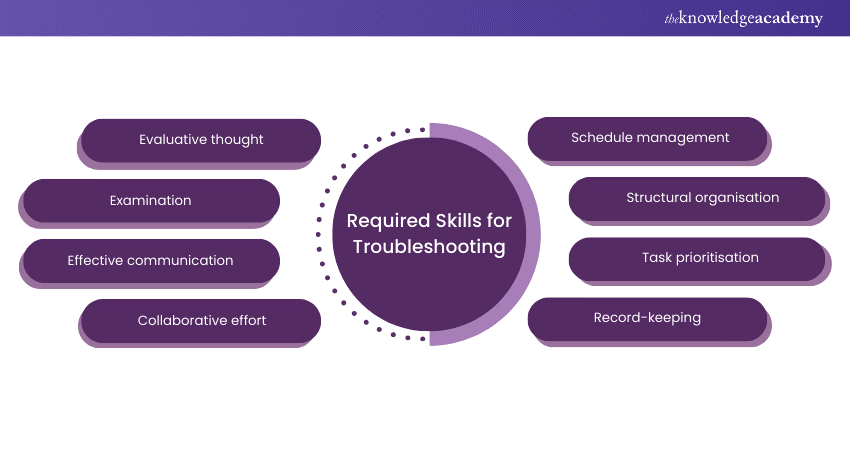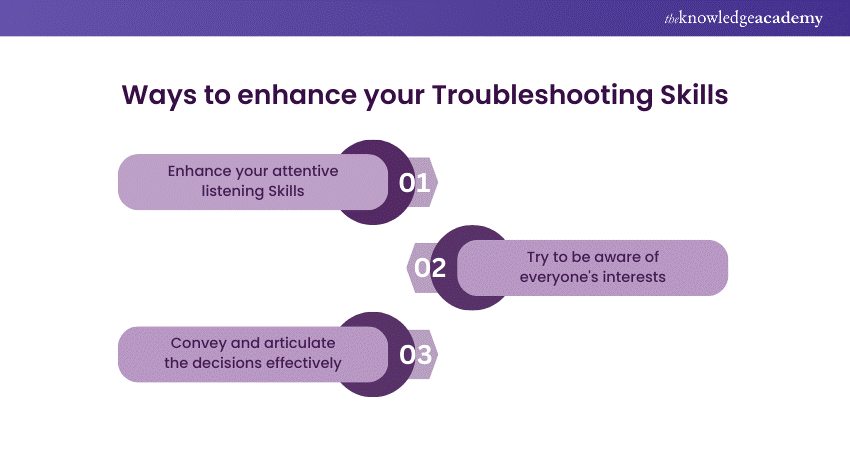We may not have the course you’re looking for. If you enquire or give us a call on + 1-866 272 8822 and speak to our training experts, we may still be able to help with your training requirements.
Training Outcomes Within Your Budget!
We ensure quality, budget-alignment, and timely delivery by our expert instructors.

Nowadays, individuals with exceptional Troubleshooting Skills are highly sought after. Whether you are in IT, customer service, project management, or any other field, the ability to Troubleshoot effectively can make a significant difference in your career. In this blog, we will delve into the crucial Troubleshooting Skills that every professional should possess and ways to enhance these skills.
Table of Contents
1) Required skills for Troubleshooting
a) Evaluative thought
b) Examination
c) Effective communication
d) Collaborative effort
e) Schedule management
f) Structural organisation
g) Task prioritisation
h) Record-keeping
2) Ways to enhance your Troubleshooting Skills
3) Conclusion
Required skills for Troubleshooting
Navigating professional challenges demands a robust skill set. Discover the essential skills that form the foundation of effective Troubleshooting, from evaluative thought to schedule management. Elevate your problem-solving abilities with these indispensable capabilities:
1) Evaluative thought
Evaluative thought is the cornerstone of Troubleshooting Skills. It involves the ability to analyse situations critically, identify problems, and develop viable solutions. Professionals with strong evaluative thought can dissect complex issues, discern root causes, and propose effective remedies. This skill requires a combination of logical reasoning, analytical thinking, and an eye for detail. In Troubleshooting, being able to evaluate different aspects of a problem ensures that solutions are not just quick fixes but sustainable resolutions.
2) Examination
Examination skills involve the systematic review of information and resources to inherit a comprehensive understanding of a problem. This includes gathering relevant data, conducting thorough research, and exploring potential factors contributing to the issue at hand. Professionals proficient in the examination can sift through a myriad of information to pinpoint the key elements essential for Troubleshooting. This skill is important for making informed decisions and avoiding hasty judgments that might exacerbate the problem.
3) Effective communication
Clear and concise communication is paramount in Troubleshooting. Professionals need to convey their thoughts, findings, and proposed solutions in a way that is easily understandable to both technical and non-technical stakeholders. This skill involves not only verbal communication but also the ability to articulate ideas in written form. Effective communication makes sure that everyone involved in the Troubleshooting process is on the same page, minimising misunderstandings and facilitating a smoother resolution.
4) Collaborative effort
Many Troubleshooting scenarios require collaboration among team members or departments. The ability to work effectively in a team, leveraging diverse skills and perspectives, is a vital Troubleshooting skill. Professionals should be adept at fostering a collaborative environment, encouraging open communication, and valuing the input of others. Collaboration not only enhances the quality of Troubleshooting but also promotes a positive and cohesive work culture.

5) Schedule management
Time is often of the essence in Troubleshooting. Professionals must be skilled in managing their time efficiently to address issues promptly. This involves setting priorities, allocating resources wisely, and adhering to deadlines. Schedule management ensures that the Troubleshooting process is not only practical but also conducted within acceptable time frames, preventing prolonged disruptions to operations.
6) Structural organisation
Structural organisation refers to the ability to arrange and manage information systematically. Troubleshooting often involves dealing with a plethora of data, documents, and feedback. Professionals should be adept at organising this information in a structured manner, making it easily accessible and understandable. A well-organised approach facilitates a smoother Troubleshooting process, preventing crucial details from slipping through the cracks.
7) Task prioritisation
In Troubleshooting, not all tasks have the same urgency or importance. Task prioritisation is the skill of identifying and addressing the most critical issues first. Professionals need to assess the impact of each problem and allocate their resources to tackle the most pressing matters. This skill ensures that the Troubleshooting process is efficient and that significant issues are resolved before they escalate.
8) Record-keeping
Keeping detailed records of Troubleshooting activities is essential for future reference and continuous improvement. This includes documenting the steps taken, solutions applied, and outcomes achieved. Professionals proficient in record-keeping can create a valuable knowledge base that can be looked into for similar issues in the future. This not only streamlines the Troubleshooting process but also contributes to organisational learning and development.
Discover the intricacies of IT Support with our IT Support and Solution Training today!
Ways to enhance your Troubleshooting Skills
Discover practical tips to boost your Troubleshooting prowess and confidently navigate professional challenges. Elevate your problem-solving game through simple yet effective strategies:

1) Enhance your attentive listening Skills
Attentive listening is a foundational skill for effective Troubleshooting. By actively listening to colleagues, clients, or team members, professionals can gain valuable insights into the nature of the problem. This involves not only hearing words but also understanding the underlying concerns and emotions. Practising attentive listening fosters better collaboration and ensures that Troubleshooting efforts are aligned with the actual needs of the stakeholders involved.
2) Try to be aware of everyone's interests
Understanding the field of interests of all parties involved in a Troubleshooting scenario is crucial for finding balanced and equitable solutions. Professionals should be attuned to the perspectives, goals, and concerns of stakeholders to navigate potential conflicts and make sure that the chosen solutions align with the broader interests of the organisation.
3) Convey and articulate decisions effectively
Communication is a recurring theme in Troubleshooting Skills, and effective decision-making is no exception. Once a solution is identified, professionals must be able to convey their decisions clearly and persuasively. This involves explaining the rationale behind the chosen course of action and addressing potential concerns or questions. A well-articulated decision ensures that everyone involved understands the chosen path and is committed to its successful implementation.
Enhance your Troubleshooting Skills with macOS Mojave Troubleshooting and Support Training!
Conclusion
Troubleshooting Skills are indispensable for professionals across various industries. Evaluating thoughtfully, examining comprehensively, communicating effectively, and collaborating seamlessly sets the foundation for successful Troubleshooting. Additionally, skills such as schedule management, structural organisation, task prioritisation, and record-keeping contribute to the efficiency and sustainability of the Troubleshooting process.
Dive into the world of network storage and printing with our Samba Server Training!
Frequently Asked Questions

Effective communication is pivotal in Troubleshooting Skills as it ensures clear articulation of issues, fosters collaboration, and minimises misunderstandings. It enables professionals to convey decisions and findings precisely, enhancing the problem-solving process.

Record-keeping creates a valuable knowledge base for Troubleshooting by documenting steps, solutions, and outcomes. This historical data aids in future problem-solving, promotes organisational learning and streamlines the resolution of similar issues in a more efficient and informed manner.

The Knowledge Academy enhances global learning with a vast selection of over 30,000 online courses, accessible in more than 490 locations across 220 countries. This expansive reach ensures accessibility and convenience for learners worldwide.
Our diverse Online Course Catalogue covers 17 essential categories, complemented by a wealth of free educational Online Resources. These resources include up-to-date News, informative Blogs, tutorial videos, interactive webinars, and collections of interview questions. Furthermore, professionals looking for personalised education can take advantage of TKA's customisable Course Bundles, crafted to enrich and optimise the learning journey.

The Knowledge Academy's Knowledge Pass, a flexible prepaid voucher system, offers the freedom to enrol in courses over a 12-month period. Start your limitless learning adventure with us and embrace education that knows no bounds.

Discover an array of IT Support and Solution Training Courses at The Knowledge Academy, featuring specialised training in MacOS Mojave Troubleshooting and Support, VPN, and Samba Server. Designed for different skill levels, our courses provide the necessary technical expertise to meet business IT needs.
Whether you're starting out or looking to upgrade your Skills, immerse yourself in our IT Support and Solution blogs for further understanding and expertise. Embark on a journey with us to elevate your IT Support and Solution proficiency!
Upcoming IT Infrastructure & Networking Resources Batches & Dates
Date
 Computer Hardware Troubleshooting Course
Computer Hardware Troubleshooting Course
Fri 13th Dec 2024
Fri 3rd Jan 2025
Fri 28th Mar 2025
Fri 23rd May 2025
Fri 4th Jul 2025
Fri 5th Sep 2025
Fri 24th Oct 2025







 Top Rated Course
Top Rated Course



 If you wish to make any changes to your course, please
If you wish to make any changes to your course, please


